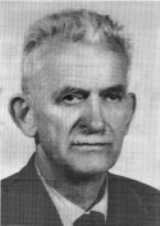
Henryk Sniegocki
Encyclopedia

Greater Poland Uprising (1918–1919)
The Greater Poland Uprising of 1918–1919, or Wielkopolska Uprising of 1918–1919 or Posnanian War was a military insurrection of Poles in the Greater Poland region against Germany...
. In free Poland the head of the Scout Troops in Greater-Poland
Greater Poland
Greater Poland or Great Poland, often known by its Polish name Wielkopolska is a historical region of west-central Poland. Its chief city is Poznań.The boundaries of Greater Poland have varied somewhat throughout history...
in 1919 and Commander of the Greater-Poland
Greater Poland
Greater Poland or Great Poland, often known by its Polish name Wielkopolska is a historical region of west-central Poland. Its chief city is Poznań.The boundaries of Greater Poland have varied somewhat throughout history...
Banner 1925–1927, a schoolteacher.
Śniegocki descended from the major part of Polish community, supported the insurgent idea of freedom fighting, as well as positivist ideas of organic work. Like most of his peers, he found contacts within Polish secret organizations while in school: he became a member of TZZ, a society named after Tomasz Zan
Tomasz Zan
Tomasz Zan , was a Polish poet and activist.In 1817 he was a cofounder of the Philomatic Association , in 1820, Radiant Association , in 1820-1823 president of Filaret Association , all of them student organizations in Vilna dedicated to Polish cultural and political...
). Financial conditions did not allow him to continue education after finishing middle school, so-called departmental (of nine classes). The family became poor in 1848, when his grandfather, Kazimierz Śniegocki, lost the transported organization money in a police hunt. The elder Śniegocki considered a duty of conscience and honor to return it from his own possessions and soon after died in 1852. Subsequently, Henryk began professional training to be a surveyor.
Henry Śniegocki joined the Association "Iskra" (Spark). This formally independent youth organization from 1903, like the following next "Brzask" (the Dawn) and "Ogniwo" (the Link), was in fact an attachment to Association of Falcons. One could say, breeding the Falcons nestlings.
On October 17 in the flat of Henry Śniegocki came into existence the first organization of Greater-Poland Boy Scouts, formed by Cezary Jindra, Henryk Śniegocki, Wincenty Wierzejewski, Edmund Weclawski, Leonard Skowroński and Tadeusz Wolski.
In January 1915, Henryk Śniegocki came back from the front lines of World War I
World War I
World War I , which was predominantly called the World War or the Great War from its occurrence until 1939, and the First World War or World War I thereafter, was a major war centred in Europe that began on 28 July 1914 and lasted until 11 November 1918...
on sick leave and managed to extend his leave by the local medical committee. A few weeks later the wounded Wierzejewski turned up for a treatment. After recovery, he decided to desert. Henryk Śniegocki, who now took the command of the Scout troops after Wierzejewski, tried to make the status of scoutting legal with the pretext of caring for the boys whose fathers mobilized the Army, but without success.
Henryk Śniegocki became the Chief of Scouts troop in the Directorate of Greater-Poland Scout Troops (with Anna Krysiewicz, commanding the Girl Guides). In July 1919 he was one of three delegates for the meeting, resulting in merger of Greater-Poland Scouts with the ZHP. However, in 1920 he volunteered, as already experienced organizer to the plebiscite of the Mazurs and next, fought in the II and III Silesia uprising.

